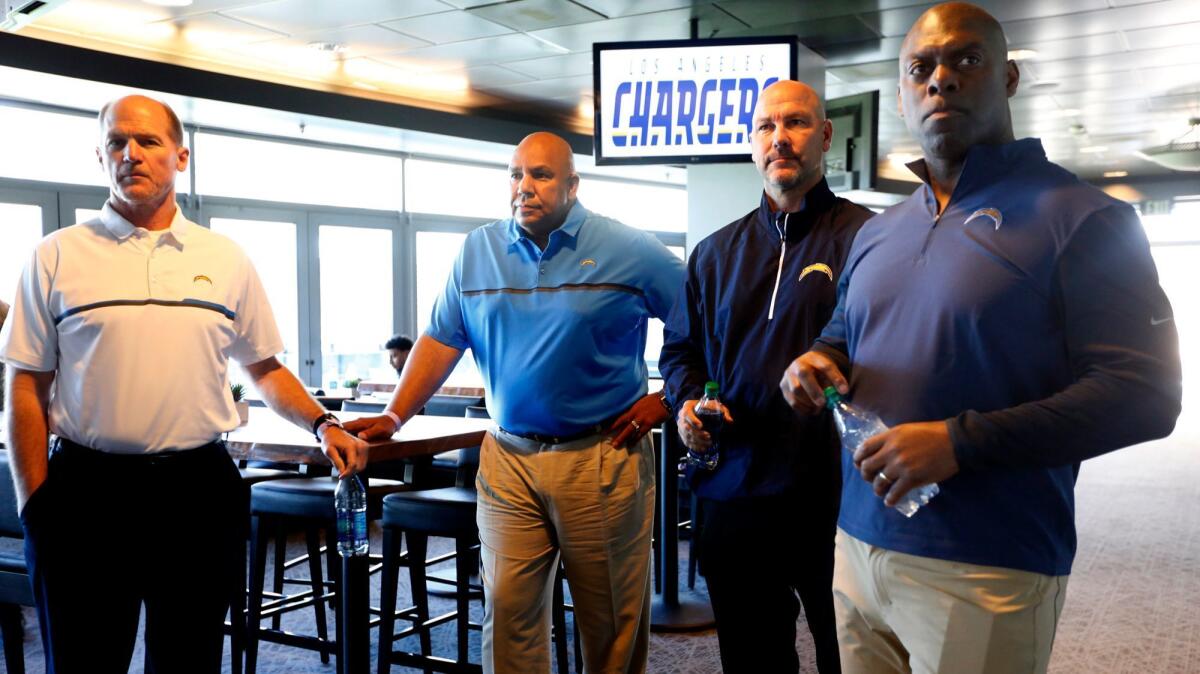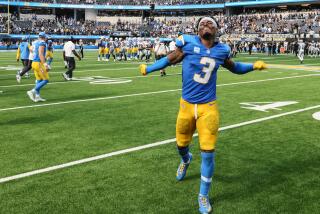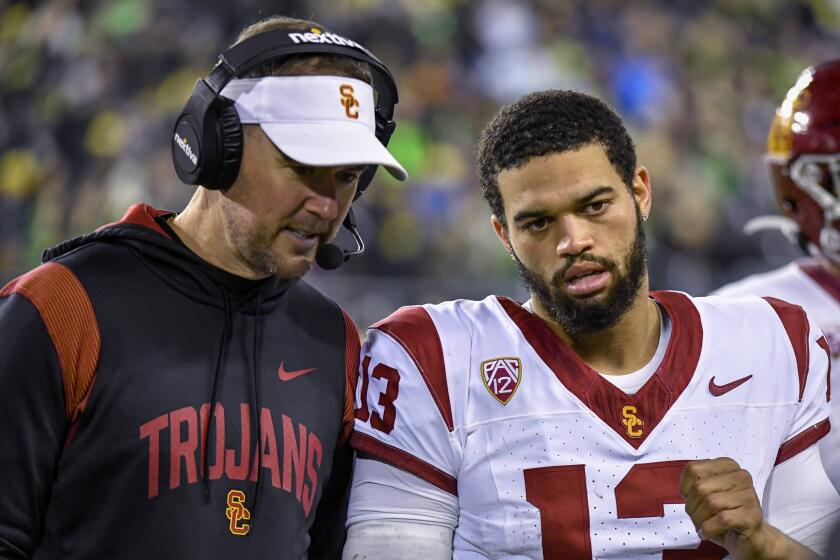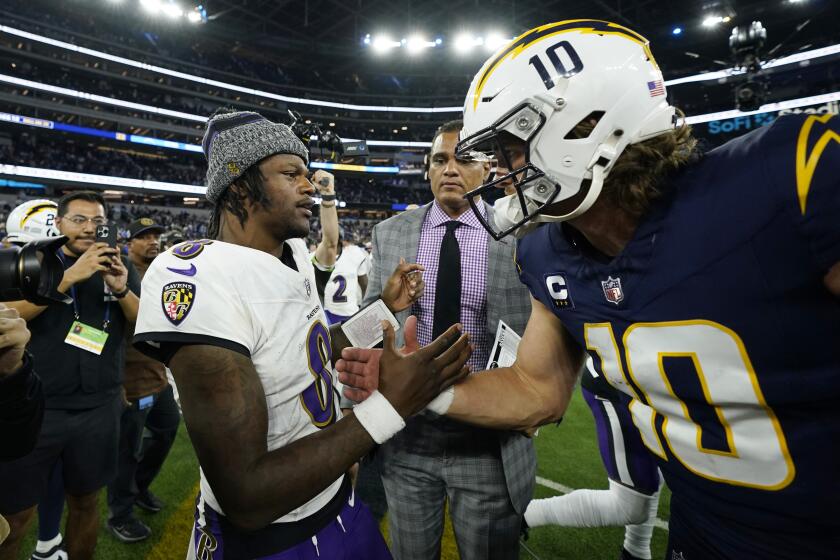Chargers’ Gus Bradley is a coach that can’t give it a rest

Gus Bradley actually entertained the thought of taking a year off from football when he was fired by the Jacksonville Jaguars last Dec. 19, an entirely expected sacking that ended Bradley’s 14-48 run over four seasons, the second-worst winning percentage (.226) of any NFL head coach with at least 50 games on his resume.
The prospect of decompressing at his Jacksonville home with his wife, Michaela, and watching his oldest son, Carter, play his senior season of high school football had some appeal.
Bradley could get more involved with his other kids — Anna, a high school sophomore, Eli, an eighth-grader, and Ella, a fourth-grader — and be the stay-at-home dad who contributes to the carpool and helps with homework.
“Sometimes in coaching, there’s a time and a place where you feel like you need to get back to your family because they’ve been so supportive,” Bradley, 51, said. “There was a little bit of that, when I thought, ‘You know what? Take a year. It’s time to give back to the family.’ ”
Three weeks later, Bradley interviewed for the Chargers defensive coordinator job, which he accepted in January. In the brief time he was unemployed, Bradley, who has coached football every season since 1990, realized he had far too much energy, passion and love for the game to step away, even for a year.
And his family wasn’t necessarily ready to have him back full time.
“They really wanted no part of it,” Bradley said with a laugh after a training camp practice in Costa Mesa. “It was only three weeks, and they were like, ‘Man, you’ve got to coach, you’ve got to coach.’ I would have driven a lot of people crazy had I stayed home for a year.”
Bradley barely had time to process the end of his disappointing tenure with the Jaguars before diving into his new role under Chargers first-year coach Anthony Lynn and the task of rebuilding a defense that ranked 29th in the NFL with an average of 26.4 points allowed per game last season.
“When it happens, there’s a part of you that really hurts because you care so much about the team,” Bradley said.
“But you always tell players that you have to move on to the next opportunity. When I came out here, it was really exciting.”
If Bradley can have the kind of impact in Los Angeles that he had in Seattle, where he was defensive coordinator from 2009-2012, the Chargers defense could eventually rival their prolific Philip Rivers-led offense. Bradley, who coached for 10 years at North Dakota State before matriculating to the NFL in 2006, helped build the “Legion of Boom,” the swarming Seahawks unit that allowed the fewest points in the NFL in Bradley’s last season (2012) and keyed Seattle’s Super Bowl runs in 2013 and 2014.
“He had a great impact on our program,” Seahawks coach Pete Carroll said. “He set things in motion for us on the defensive side of the ball in a way we’ve worked to maintain over the years.”
Under Bradley, the Chargers have switched from a 3-4 front to a 4-3, and they will feature more zone concepts in the secondary. The roles of star edge rushers Joey Bosa and Melvin Ingram won’t change much, and tackles Brandon Mebane and Corey Liuget still will be responsible for clogging up the middle.
The free safeties — led by Dwight Lowery and Tre Boston — will play up top, more like a center fielder providing a last line of defense, while strong safety Jahleel Addae will pinch closer to the box.
Pro Bowl cornerbacks Casey Hayward and Jason Verrett will mix some man-to-man with zone coverage in a “cover three” scheme designed for their play-making abilities.
The linebackers — Korey Toomer and Nick Dzubnar in the middle; Jatavis Brown and Kyle Emanuel outside — will read and react to the quarterback.
Instincts and anticipation will be as important as physicality.
“First and foremost, we want to play fast,” Bradley said. “There’s a lot of pre-snap and post-snap things that we go off of, but it’s basically a system where you give a variety of different looks to the quarterback, yet it’s simple for the players. Hopefully, there’s not a lot of thinking, and we can utilize our speed.”
The Chargers ranked fourth in the NFL in turnovers (28) and tied for first in interceptions (18) last season, and those will be heavy points of emphasis with Bradley.
“He’s getting us to focus on takeaways, stripping the ball out, making sure guys run down the line, run to the ball,” said Mebane, who played four years under Bradley in Seattle. “One of the foundations of the defense is causing turnovers.”
The perennially upbeat Bradley tried to create a competitive but fun atmosphere in camp. He devised a point system based on statistics such as tackles, interceptions and forced fumbles. The winner of the daily competition got to wear a WWE-style championship belt that Bradley purchased before camp.
“He strikes me as a law-of-attraction kind of guy,” said Lowery, who played for Bradley in Jacksonville in 2013. “He focuses on the positive. ... You get that positive mind frame before your day even starts in the meeting room, and you carry that onto the field.”
It’s funny how the NFL works sometimes. When Jacksonville had an offensive coordinator opening in 2015, Lynn, then a New York Jets assistant, spent eight hours — much of it with Bradley — interviewing for the position.
Two years later, after Lynn got the head job with the Chargers, one of his first calls was to Bradley. Carroll, who didn’t hire Bradley in Seattle but retained him after taking over the Seahawks in 2010, said Lynn will not regret that call.
“Gus is one of a kind, an extraordinary individual,” Carroll said. “There’s no one who has a better outlook on life and on work in football and dealing with people than Gus. He’s a beautiful person.”
Twitter: @MikeDiGiovanna
More to Read
Go beyond the scoreboard
Get the latest on L.A.'s teams in the daily Sports Report newsletter.
You may occasionally receive promotional content from the Los Angeles Times.








